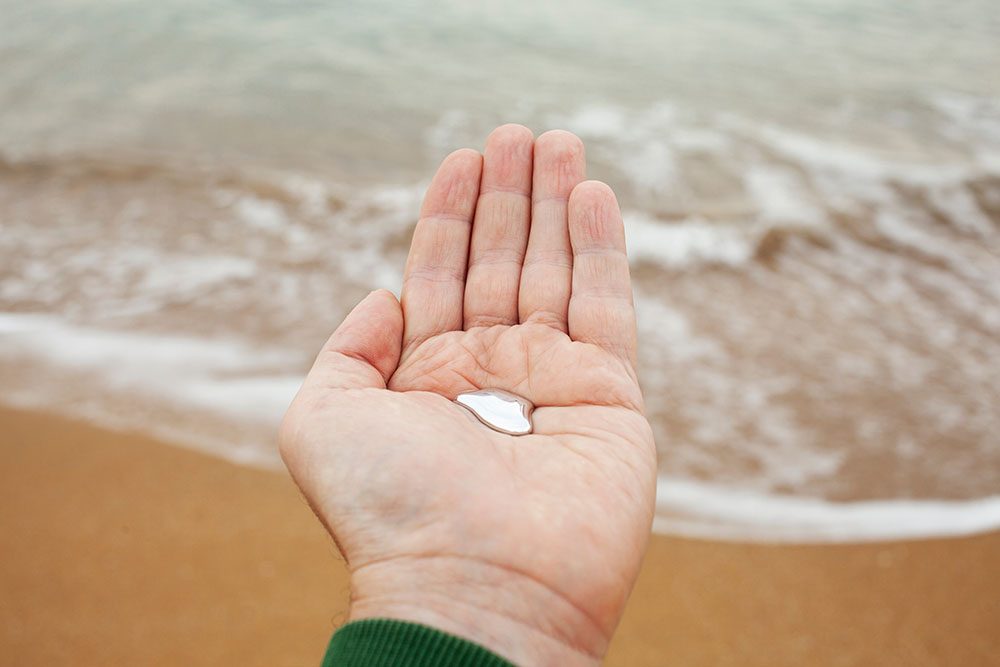What Happens When You Touch Mercury?

CONTENTS
- Understanding mercury and its toxicity
- Routes of mercury exposure
- Vulnerable people and mercury sensitivity
- Immediate health risks of touching mercury
- What to do after accidental mercury contact
- Get in touch
With hazardous substances, mercury holds a unique position. Despite its harmless appearance and widespread use in various industries and products such as fluorescent lights and batteries, mercury is far from harmless when it comes into contact with human skin.
At ICE Cleaning, we offer mercury spill cleaning services, including off-site disposal for your safety. We can effectively contain and remove all traces of mercury, extracting dangerous vapours from the air and making your property safe again.
Read on to understand these risks associated with touching mercury and how you can take necessary precautions when dealing with this dangerous element in the event of a spill.
Understanding mercury and its toxicity
Mercury, also known as quicksilver, is a naturally occurring chemical element that exists in several forms. It is the only metal that remains liquid at room temperature and was widely used due to its unique properties.
Mercury can be found in everyday objects such as fluorescent light bulbs, batteries, and even dental fillings in small amounts. However, despite its use, mercury exposure can pose significant health risks.
The toxicity of mercury lies primarily in its ability to bind with proteins present within our cells. This disrupts cellular function, damaging or killing cells. The danger increases when it enters our bloodstream through various routes, including inhalation of vapours or direct skin contact.
Different forms of mercury have different toxicity levels; elemental (metallic) mercury is less toxic than organic compounds like methylmercury, which are highly potent neurotoxins.
Studies suggest these toxins may cause harmful effects on the nervous system if exposed over long periods. A single exposure incident might not lead to immediate symptoms, but chronic exposure could result in health conditions affecting multiple organs.
Routes of mercury exposure
The primary concern with mercury is dermal or skin contact. Touching mercury can lead to absorption through the skin and into your bloodstream. This route is particularly concerning because it bypasses many of the body's natural defence mechanisms against toxins.
While elemental mercury does not absorb readily through intact skin due to its low solubility in water and lipids, prolonged or repeated contact may result in harmful effects. Furthermore, cuts or abrasions on the skin increase susceptibility as they provide an open pathway into your system.
Other routes of exposure
Beyond direct touch, ingestion and inhalation are other possible ways of exposure to this toxic substance. Ingestion typically occurs when people consume contaminated food or water, while inhalation happens when vapours from heated or evaporated mercury are inhaled.
Inhalation poses a significant risk as gaseous forms of mercury can enter the lungs and then pass rapidly into the bloodstream, where it travels throughout your body, causing damage along its path.
In the event of accidental exposure, seek immediate medical attention. Remember that understanding these routes of exposure is key in mitigating risks associated with this toxic substance.
Vulnerable people and mercury sensitivity
Certain populations are particularly vulnerable to mercury exposure, including pregnant individuals, children, and individuals with pre-existing health conditions.
Pregnant people exposed to high levels of mercury can pass the toxin onto their unborn child through the placenta. This exposure can lead to serious developmental issues in infants, affecting cognitive thinking, memory, and fine motor skills.
The developing brains of children also make them susceptible to mercury toxicity. Even low-level chronic exposures can result in neurodevelopmental effects like attention deficit hyperactivity disorder (ADHD) symptoms or learning disabilities.
Certain medical conditions may increase someone's sensitivity or susceptibility to adverse effects from mercury exposure. This is because of its ability to accumulate within body tissues over time, causing potential kidney damage or impaired lung function.
Understanding the risks associated with mercury exposure is critical in safeguarding vulnerable populations. By adhering to safety protocols and guidelines set by health organisations, we can mitigate these risks and ensure a safer environment.
Immediate health risks of touching mercury
Mercury, particularly in its liquid form, can easily permeate human skin or be inhaled if vapours are present. The body systems most affected by this exposure include the nervous system, digestive tract, and kidneys.
Potential symptoms that may occur immediately after direct skin contact with mercury include redness, swelling, and peeling of the skin. In more severe cases where a large amount is absorbed, individuals might experience:
- Tremors
- Mood swings
- Irritability
- Nervousness
- Insomnia
- Neuromuscular changes
- Muscle atrophy
What to do after accidental mercury contact
In the unfortunate event of accidental contact with mercury, you must follow a strict protocol for your safety. The UK Government provides comprehensive guidelines on how to manage a spill and minimise health risks.
The first step after mercury exposure is immediate isolation of the affected area. This involves removing any contaminated clothing or jewellery and ensuring, that no further spread occurs.
Cleaning the skin thoroughly using warm water and soap can help remove traces of this toxic substance. However, refrain from scrubbing as it may lead to deeper penetration into the skin.
Safety measures to prevent further spread of contamination
If you find yourself in a situation where there is an uncontrolled spillage involving mercury-containing materials at home, ensure everyone leaves the room immediately while avoiding direct physical contact with these substances.
Avoid vacuum cleaning as this could disperse toxic vapours around your house, making decontamination even more difficult.
If accidental contact with mercury occurs, it is advisable to seek immediate medical attention. Furthermore, consider hiring a professional cleaning service experienced in hazardous waste disposal to ensure the safe removal of all traces of this toxic substance from your home.
Get in touch
If you require emergency mercury spill clean-up services, ICE Cleaning can help. We can be on-site within a few hours to assist you in disposal and decontamination. Regardless of the spill size, we can make your property safe again for work or habitation.
To learn more about our mercury spill cleaning and disposal services, contact our team today at 0208 066 0360 or enquiries@icecleaning.co.uk. We can assist you 24/7, 365 days a year, no matter where you are in the UK. Our services are stationed nationwide, ensuring you get help no matter where you are.

Speak with me today,
I’m here to help
By asking you a few questions either via phone or email I can immediately provide a realistic estimation of the cost.
You’re in good company. We’ve cleaned for the following commercial clients… View all

Why choose us?
- Cater to a wide variety of cleaning situations
- Nationwide coverage, available 24/7
- Cater to commercial and domestic clients
- Free survey provided prior to quotation
- Emergency response team
- Offer a bespoke service designed to suit all your needs
- All technicians hold professional health and safety qualifications, including BICSc, IOSH, Dewpoint Professional & Safe Contractor
We’re fully accredited
We place best practise, professional expertise and health and safety at the core of our business. We’re fully compliant with all legal obligations. You can view a list of our accreditations below, or visit our Health & Safety page for more information.











-RGB-small.1707319151.jpg)




















